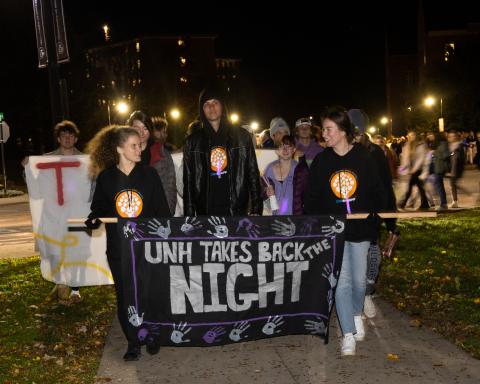The SHARPP Center’s Community Educators (CEs) help spread the word about interpersonal violence (IPV) prevention at UNH. CEs support the SHARPP Center prevention education and engagement team through tabling, staffing events, and facilitating interactive programs and activities for the UNH community. CEs focus on educating their peers on the topics of consent, healthy relationships, rape culture, bystander intervention, and more!
Who is eligible to be a Community Educator?
All UNH undergraduate and graduate students with a passion and enthusiasm for violence prevention education, social justice, and awareness-raising are eligible to become Community Educators. If you are a student at UNH Law or UNH Manchester/CPS and are interested in becoming a CE, please reach out to our Expanded Services Coordinator for more information.

What is the training process?
To become a Community Educator, you will be trained by SHARPP Center staff through the SHARPP Leaders Institute on some of the below topics:
- SHARPP services and resources
- Consent, healthy relationships, rape culture, and bystander intervention
- Peer-to-peer education
- Activism
- Presentation and facilitation skills
- Dynamics of privilege and oppression
When will the training be held?
Saturday January 24, 2026 & Sunday, January 25, 2026 from 10am-6pm.
Attendance for both days in full is required.
Register Now!
Registration deadline is January 12, 2026
What is the time commitment?

After completion of the SHARPP Leaders Institute training, students will meet with SHARPP's Prevention Specialist and Assistant Director of Engagement & Prevention to finish the rest of their CE training. Students can expect to commit to volunteering for six SHARPP events/initiatives per semester. These could include tabling, working our annual events (Take Back the Night, Open House), or facilitating prevention programs around campus. There are numerous ways to fulfill this commitment and SHARPP staff work with CEs individually to create a volunteer experience that works best for them!
What is expected of me after training?
In addition to the 6 volunteer shifts per semester (shifts are on average 1-3hrs), Community Educators are asked to:
- Commit to SHARPP for a minimum of 2 semesters
- Attend Community Educator meetings throughout the academic year (maximum of 1-2 per semester)
- Complete 6 hours of professional development engagements per academic year
What skills will I learn by being a Community Educator?

There are many benefits to becoming a Community Educator, including:
- Gaining more knowledge of IPV issues and violence prevention strategies
- Increasing your comfort-level in discussing these topics and public speaking
- Opportunity to make a difference in your community
- Active engagement in social justice
- Valuable connections with fellow students who share the same passion as you do around this work
This training does not allow for confidential advocacy under NH RSA 173-C.